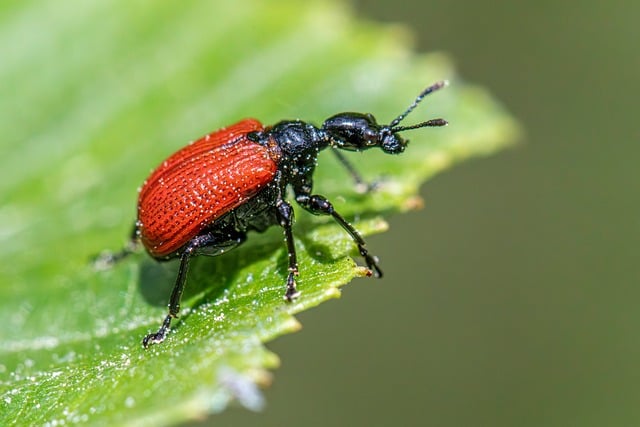Grain weevils cause significant yield losses and quality degradation for farmers, but effective prevention involves understanding their behavior and sensory cues. Eco-friendly weevil solutions focus on disrupting their preferred conditions through improved ventilation, clean environments, and reduced scent exposure. Practices like regular cleaning, natural repellents (e.g., neem oil, cinnamon, cloves), and monitoring infestations early enable farmers to employ these solutions, aligning with sustainable agricultural practices while minimizing chemical treatments and environmental impact.
Grain weevils can devastate stored crops, but there are effective, eco-friendly solutions to reduce their appeal. This comprehensive guide offers expert advice on navigating the world of weevil prevention. We explore storage practices that deter these pests naturally, discussing the power of organic repellents and early detection techniques. By understanding grain weevils’ preferences, you can implement strategic measures to keep them at bay, ensuring a secure harvest with minimal environmental impact. Discover how to transform your storage spaces into a weevil-free zone.
Understanding Grain Weevils and Their Attraction
Grain weevils are common pests that can cause significant damage to stored grains and cereals, leading to reduced food quality and yield losses for farmers. Understanding their behavior and what attracts them is a crucial first step in developing effective prevention strategies. These tiny critters are drawn to specific scents, moisture levels, and accessible food sources. Their attraction to grain products is often linked to the presence of starchy materials and the heat generated during storage, which signals ripe or fermenting grains.
Adopting eco-friendly weevil solutions involves implementing practices that disrupt their sensory cues and living conditions. This includes maintaining proper ventilation in storage areas to reduce moisture buildup and heat accumulation, ensuring clean and dry environments, and minimizing exposure to attractive scents by using airtight containers. By removing these attractants, farmers can deter grain weevils naturally, promoting a healthier and more sustainable agricultural ecosystem.
Eco-Friendly Storage Practices to Deter Weevils
Adopting eco-friendly storage practices is a powerful strategy to deter grain weevils naturally, without resorting to chemical treatments. One effective method involves maintaining impeccable cleanliness in storage areas. Weevils are attracted to grains and other food sources, so regular cleaning and removing any debris or infested items can significantly reduce their presence. Implementing good hygiene practices, such as sweeping and mopping floors, washing down walls, and ensuring proper ventilation, creates an environment that discourages weevils from establishing themselves.
Additionally, using natural repellents like neem oil or essential oils can provide an eco-friendly solution. These substances have insecticidal properties and can be safely applied to grain storage areas. Natural barriers like sacking or bags made from organic materials can also help contain grains and prevent weevil access, offering a simple yet effective deterrent. By combining these practices, individuals and businesses can effectively manage weevil infestations while promoting sustainable agricultural and storage methods.
Natural Repellents and Their Application
Natural repellents offer an appealing approach to grain weevil control, providing eco-friendly weevil solutions that are both effective and safe. Plant-derived compounds like neem oil, cinnamon, and cloves have shown promise in deterring these pests due to their unique chemical compositions. These natural substances can be directly applied to stored grains or incorporated into protective coatings for packaging materials. For instance, a mixture of neem oil and water can be sprayed onto grain surfaces, creating a barrier that repels weevils.
The application process is relatively straightforward, ensuring these eco-friendly solutions are accessible to farmers and food storage facilities. Regular treatments with natural repellents, especially during initial signs of weevil infestation, can significantly reduce attraction and prevent further damage. This method aligns with sustainable practices, avoiding synthetic chemicals, and offers a holistic approach to managing grain weevils while maintaining environmental integrity.
Monitoring and Early Detection Strategies
Monitoring and early detection are key strategies in the battle against grain weevils, offering a chance to implement effective, eco-friendly weevil solutions. Regular inspections can help identify signs of an infestation at its earliest stages. This includes visually examining stored grains for any visible weevil activity, as well as using pheromone traps. These traps, designed to detect male weevils, provide valuable data on the presence and movement of these pests. By combining these monitoring methods, farmers and storage facility managers can quickly respond to potential issues, preventing a full-blown infestation from occurring.
Early detection allows for more targeted and environmentally conscious control measures. It encourages proactive management rather than reactive treatments, which often involve harsh chemicals. With eco-friendly weevil solutions at hand, it’s possible to mitigate the risk of these pests without compromising the integrity of stored grains or damaging the environment.
By implementing these expert strategies, from understanding grain weevil behavior to utilizing natural repellents and adopting eco-friendly storage practices, homeowners and agricultural professionals alike can effectively reduce attractants for grain weevils. Embracing these sustainable solutions not only minimizes the reliance on chemical treatments but also contributes to a healthier environment and ensures the longevity of stored grains. Discovering the right balance between prevention and early detection is key to managing this pest, allowing folks to make informed choices with regard to eco-friendly weevil solutions.
